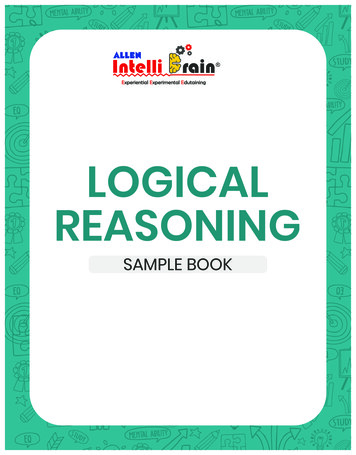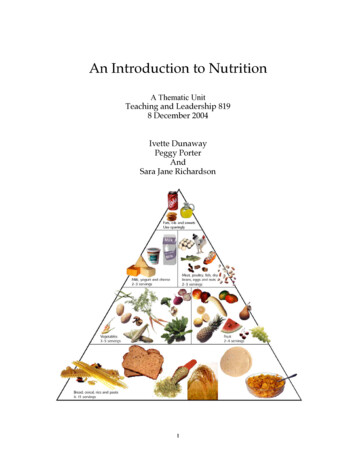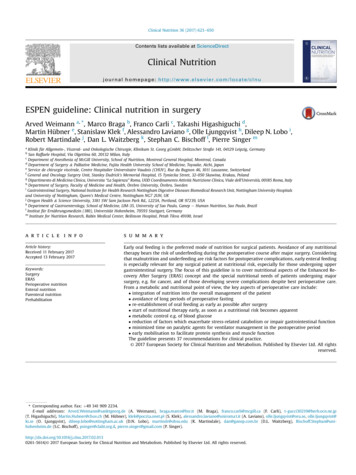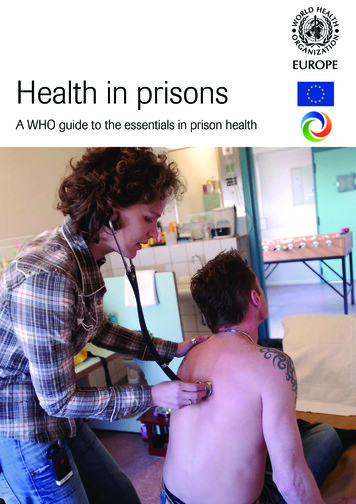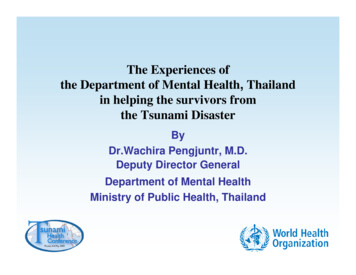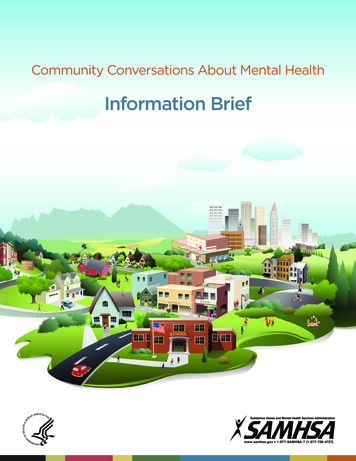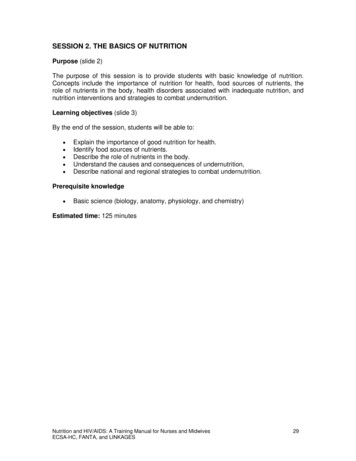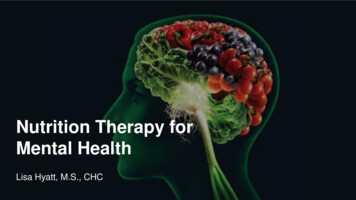
Transcription
Nutrition Therapy forMental HealthLisa Hyatt, M.S., CHC
GOALS1. Basic brain/gut connection4. Food influence on gut bacteriabalance and mood and behavior2. Gut microbiome/bacteria balance5. Blood sugar balance as a keycomponent in mental health3. Gut bacteria balance influencesneurotransmitters/mood andbehavior6. Food allergies/sensitivities7. Simple steps that can be takento support mental health
Recovery from PanicAnxiety DisorderAn unexpected path
“ A dark hole I couldn’t get out of ” and never thought I wouldParanoiaTremblingDetachment from self and othersRacing heartShortness breathFear or dying or going crazy
Healer Heal ThyselfAfter years of suffering No medication No therapy No one with educatedknowledge of disorder No idea what to doInterest inIntegrative/Functionalmedicine and nutrition .Side effect: elimination ofsymptoms.Physical and Mental
Functional Medicine NutritionEvolution in the practice of medicine the 21st century.Underlying causes of diseaseDisease-centered focus vs patient-centered approachWhole person vs isolated set of symptomsBio-individualityEmpowers patients-Institute for Functional Medicine
ighCholesterolIBSArthritisAll isolated set of symptomsor are they interconnected?
EpigeneticsBehavior and environment- influence which of our genes are turned on or off“What you eat, how you move, how you restore your system, along with your thoughts, feelings and socialconnections regulate your genes. And those genes end up creating the expression of who you are andhow you are. You can turn on genes that create health or disease, weight gain or weight loss. “-Mark Hyman, M.D.“For centuries scientists have debated whether mental illness results from inborn or environmental factors.These arguments are now fading away as most experts now agree that both factors are highly important.Gene expression can go awry from toxic chemicals, emotional trauma, oxidative stress, medication sideeffects, abnormal nutrient levels.”-William J. Walsh, PhD.
Nutrition: A Necessary Science Complex biochemical pathwaysrunning 24/7 Vitamins, minerals, nutrients allneeded for these pathways to runcorrectly and optimally Role of nutrients in the cause,treatment, and prevention ofdisease.
what we eat and how we take careof our bodies directly affectsbrain function
Mind-Body Connection“This is the law of malnutrition: When yourfood quality or quantity deteriorates, yourmood is the first casualty, even before yourphysical health begins to deteriorate.”-Julia Ross
In 2014, the U.S. National Institute ofMental Health spent more than 1 millionon a new research program zeroing in onthe microbiome brain connection.
“In a very real sense, you have two brains — one in your head, and one in yourgut. Both are created from the same tissue during fetal development, andthey’re connected via your vagus nerve, the tenth cranial nerve that runs fromyour brain stem to your abdomen.”-Dr. Mercola, M.D.
psychoactive
Serotonin, GABA,Dopamine, EndorphinsThrough the gut brain axisgut bacteria deliver neuroactive substances thatinfluence the brain
Intestinal Microbiome protect the lining of your intestines provide a strong barrier against toxinsand “bad” bacteria limit inflammation improve how well you absorb nutrientsfrom your food activate neural pathways that travel directly between the gut andthe brain.
Can changing the bacteria in our gut improvebrain function?2016- 1st human trial to prove that changing the gutmicrobiota by increasing good bacteria improves brainfunction-J Neurogastroenterol Motil.
95% of serotonin receptorsfound in the lining of the gutNeurotransmitterSleep, Appetite, Mediates moods, Inhibitspain.
GABA: thecalming brain chemicalLow high anxiety, panic, stress,inability to relaxDepleted from: Stress, Trauma,Pain, Fear, Anxiety, Anger, GriefPanicSufficient Relaxed, good stresstolerance
Good Bacteriasecretes GABAHappy Gut HappyBrain Specific types of probiotics (lactobacillus, and bifidobacterium)produce GABA abundance Multiple studies- already shown promise in reducing anxiety-Journal of applied microbiology
Mice engaged in obsessive-compulsiverepetitive behaviors were pacified whengiven a strain of the bacteriumBacteroides fragilis.-New York Times June 23, 2015GABA is used by inhibitory synapses more thanany other neurotransmitter in the human brainand plays a large role in inhibiting over excitationto control anxiety and stress.-Weeks, B., 2009
AlcoholBenzodiazepinesBarbituratesAll stimulate GABAreceptors.Same as certainbeneficial bacteria do.Javier A. Bravo, et al. Ingestion of Lactobacillus strain regulatesemotional behavior and central GABA receptor expression in a mousevia the vagus nerve. 2011
Treatment with Synthetic GABA agonistsSynthetic drugs that agonize GABA receptorsused to control stress, anxiety, and mood.Reduce anxiety, depression, pain,schizophrenia, and drug and alcohol addiction.Xanax, Valium, and Ambien areGABAergic in nature and have beenfound to improve GABA signaling andhave positive results in helping withanxiety, depression, and insomnia.An Integrative Approach“due to the potential side-effects and risks associated withthe use of these drugs, there is a great deal of popular andmedical interest in the use of dietary supplements andnutraceuticals in order to manage stress and anxiety”Weeks, B. 2009
How we feel bothphysically and mentally ishighly influenced by thestate of our microbiome.The balance of good andbad bacteria is critical.
First evidence that friendly bacteria from food can affect brain function inhumans by rebalancing microbiome.High vegetable, fiber healthier gut and brainWestern diet (high fat, carbs) physical and mental health problems-UCLA, journal of gastroenterology, 2013
Bad Mood Foods: A processed problem
Standard American Diet (SAD)High in sugar, refined carbohydrates, trans fat, sodium and processedfood
“Americans spend about 90 percent of their foodbudget on processed foods which contain astaggering number of artificial food additives,preservatives, colors and flavor enhancers. It’svirtually impossible to identify them all and ascertaintheir true impact on your health.”- Dr. Mercola, M.D.
Sugar and WhiteFlour Nutrientsdepleted just tobreak it down Inflammation Blood sugarchanges
Feed pathogens in the gutovertake more beneficial bacteria Suppresses the activity of BDNF (brain- derived neurotrophic factor). key growth hormone in the brain Levels are critically low in both depression and schizophrenia. Promote chronic inflammation- disrupts the normal functioning of theimmune system and the brain.- David Perlmutter, M.D
Sugar molecules brain proteins degeneration of brain and functioning
Blood Sugar Imbalances
Vicious cycle of ups anddownsSpike: Euphoria,excited, happy, calmHHappapSpike: Euphoria, ExcitementCrash: Anxiety,nervousness,Crash: Anxiety, Depression, headaches, depression,irritabilityHeadaches, Irritability
“Blood sugar increase leads to depletion ofserotonin, GABA, dopamine, epinephrine,norepinephrine.”-David Perlmutter, M.D.“Hypoglycemia causes the brain to secreteglutamate in levels that can cause agitation,depression, anger, anxiety, panic attacks and anincrease in suicide risk.”-Russell Blaylock. M.D.
3 meals and 2 snacksBalance BloodSugarA few simple steps Eliminate/reduce sugar andwhite flour Increase protein intake witheach meal Swap out refined grains withwhole grains
Consuming Probiotics may improveglucose metabolismGreater effects when taken 8 wks orlonger with multiple strains.Zang et al. Medicina, 2016
Food allergies can affect theCNS:Fatigue, slowed thought processes,irritability, agitation, aggressivebehavior, nervousness, anxiety,depression, schizophrenia,hyperactivity, learning disabilities
Food Allergies“Emotional and behavioralproblems, particularly symptomsof depression, anxiety, andADHD, are common amongadolescents with food allergy inthe general population and, inthe case of elevated levels ofdepressive symptoms, persistinto young adulthood”-European Journal of Allergy andClinical Immunology, 2016
neurologic andpsychiatric disorders
Celiac Disease Celiac Disease (CD)- immune-mediated diseasedependent on gluten (a protein present in wheat, ryeor barley). Occurs in about 1% of the population and isgenerally characterized by gastrointestinalcomplaints. The relationship of celiac disease to neurologic andpsychiatric complications has been observed for over 40yearsJackson, J. et al. Neurologic and Psychiatric Manifestations of Celiac Disease and Gluten Sensitivity, PsychiatricQuarterly, 2012.
Gluten Sensitivity Gluten sensitivity (GS): an illness distinct from celiacdisease with an estimated prevalence 6 times that ofCD. Neurologic and psychiatric complications. *May be theprime symptom in patients suffering from this disease. Gluten sensitivity may easily go unrecognized anduntreated.Jackson, J. et al. Neurologic and Psychiatric Manifestations of Celiac Disease and GlutenSensitivity, Psychiatric Quarterly, 2012.
Psychiatric symptoms and disordersassociated with CD and GS. Anxiety disorders Depressive and mood disorders Attention deficit hyperactivitydisorder (ADHD) Autism spectrum disorders Schizophrenia (may be the psychiatricdisorder with the strongestrelationship)Jackson, J. et al. Neurologic and Psychiatric Manifestations of Celiac Disease and Gluten Sensitivity,Psychiatric Quarterly, 2012.
Good Mood Foods
Leafy Greens
Mental Health Benefits#1 mood enhancing veggieReduce stress, anxiety,depressionB vitamins- support brain againststress, anxiety,depressionMagnesium- calming mineralVitamin K- Preserves good moodomega 3’s
Healthy Fats
When society became fat phobic.As we shifted from eating a high-fat, high-fiber, low-carb diet to a low fat, lowfiber, high-carb diet we began to suffer from chronic conditions linked to thebrain.- David Perlmutter, M.D
Good fat in brain creates all cell membranes in the bodyWith Bad fats- the brain can only make low-quality nerve cell membranes thatdon't function well. (trans fats, some sat fats)A diet high in essential good fats- brain cells can manufacture higher-qualitynerve cell membranes and influence nerve cells' ability to function at their peakcapacity.
Omega 3’s : More than just heart healthy.Omega 3 Fatty acids go to our brains first then the bodyMore omega 3’s we eat the better our moodsDopamine can be raised by 40%. (enhances motivation, drive)Used to treat severe and manic depressionProtect brain from damage caused from chronic stressEnhances sensitivity of serotonin receptor- reduces depression, anxiety, violence, suicideMay disrupt the brain signals that trigger the characteristic mood swings seen with bipolardisorder. (Harvard University)May have implications for successfully treating other psychiatric disorders such asdepression and schizophrenia
ProteinProtein
A must for mental health: buildingblocks for amino acidsPrecursors for neurotransmitters(emotion generators) -dopamine, serotonin, GABA, endorphins
Feel good neurotransmitters only madefrom high protein foodsMost concentrated- beef,chicken, fish, eggs, cheeseContain all 9 essentialamino acids
Not EnoughAnxietyDepressionInsomniaADDAlcohol/drug addictionvsEnoughEnergyFocusBlood Sugar Balance
Probiotic-rich Fermented Foods
“Fermented foodshelped curb socialanxiety disorder inyoung adults.”-Psychiatry Research 2015 Psych Central 2015Increase good bacteria in the gut
Important B-vitaminsB6- h el ps i n t h e pr oduct i on of n eur ot r an sm i t t er s.br ew er ’ s yeast , ban an as, cer eal gr ai n s, l egum es,veget abl es (especi al l y car r ot s, spi n ach an d peas),pot at oes, m i l k, ch eese, eggs, f i sh an d sun f l ow erSeeds.B12- helps maintain the health of nerve cells, neurotransmitter signaling.Beef and chicken liver, salmon, sardines, tuna, trout, turkey, beef, lambFolate:helps the body utilize vitamin B12 and amino acids. Garbanzo beans, Liver,pinto beans, lentils, spinach, asparagus, avocado, beets, black eyed peas,broccoli*MTHFR gene- depression, schizophrenia, cancer ( treatment active form of folic acid 5-MTHF( 5methyltetrahydrofolate))
formation of proteins andneurotransmitters. Lamb,pumpkin seeds, grass fed beef,chickpeas, cocoa powder,cashews, kefir/yogurt,mushrooms, spinach, chickenneurotransmitter release. Calmingmineral. Spinach, Chard,yogurt/kefir, pumpkin seeds,almonds, black beans, avocado,figs, dark chocolate, banana
A big bang for your buck.Foods high in tryptophan can increase serotonin levels. ChickenRed meatDairy rd & Brailey, Laboratory Evaluations for Integrative and Functional Medicine 2nd ed, 2008
Top 5 foods with high levels of serotonin anddopamine Happy focused mood1.2.3.4.5.Bananas and plantainsNuts (walnuts)Nut ButtersPineapplesAvocadoesWhen testing urinary neurotransmitters these foods mustbe avoided for 5 days!
We can teach peoplesimple steps to helpstabilize moods
Key StepsIncrease nutrient intakeReduce Sugar IntakeRemove Food SensitivitiesDecrease processed foodsEat real whole foodsIncrease probiotic rich foodsCook moreReduce systemicinflammationHelp repair/heal gutfunctionImprove neurotransmitterfunctionIncrease Energy/Motivation
So what can we do?Treat the whole person and not just each symptomRecognize that we are unique physiological beingsTeach people what to eatTeach people how to cook and prepare mealsTeach people how to achieve this on a budgetHelp make whole foods more accessible
“What you eat, how you move, how you restore your system, along with your thoughts, feelings and social connections regulate your genes. And those genes end up creating the expression of who you are and how you are. You can turn on genes that create health or
